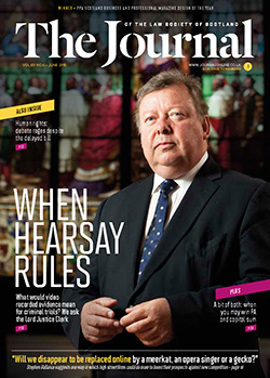The right priorities

The circumstances in the bill of advocation Christensen v Procurator Fiscal Paisley [2015] HCJAC 39 (5 May 2015) make depressing reading. The complainer was alleged to have driven on 8 July 2013 with breath alcohol more than three times the limit, while his licence had been revoked, without insurance, and also failed to give information about the driver when required to do so.
He pled not guilty, and after sundry procedure which involved the adjourning of five trial diets (four due to lack of court time), the case called for trial on 26 January 2015 when it was again adjourned due to lack of time.
A forensic pharmacologist had been cited for the defence, and was on standby on each trial date. On 26 January the sheriff was due to preside over a part-heard trial which in the event took up all of the time available and had to be further adjourned. It was averred that on one occasion another case with a shorter procedural history had been given priority.
The appeal court highlighted that the complainer had been on bail throughout, had been granted an adjournment at the first trial diet and effectively also the second, and had not been subject to interim disqualification (although this is unusual pre-trial and tends to be limited to six months). He had not been required to attend intermediate diets.
The sheriff was a retired sheriff engaged to deal with the volume of summary complaints calling for trial.
Ultimately by reference to the principles in Tudhope v Lawrie 1979 JC 44, Skeen v McLaren 1976 SLT (Notes) 14, and Paterson v PF Airdrie [2012] HCJAC 61, the court refused to pass the bill. It acknowledged this to be “a very difficult case where those responsible for administering the courts have been unable to secure the progress of this case to trial within a proper timescale”. However, the question was whether the sheriff had exercised his discretion in a manner or reached a decision which no reasonable sheriff could have reached.
The most important part of the court’s decision is the concluding words: “It appears to us that the procurator fiscal requires to actively review these priorities in close consultation with the sheriff clerk to ensure the cases which merit priority, such as those adjourned due to lack of court time or indeed for other substantial reasons, are identified and accorded that ranking at the trial diet which follows. It hardly needs saying that this case deserves the highest priority at the next trial diet.”
It is no surprise that such cases have come to the fore. The authorities from the 1970s arose out of similar court pressures following the introduction of the district court and phased takeover by the Procurator Fiscal Service of proceedings at that level.
The fiscal remains the master of the instance and can call cases in his order of choosing, or indeed not at all. The sheriff clerk has a responsibility for the court diary, the sheriff principal overall responsibility for ensuring the smooth and efficient dispatch of all court work, criminal and civil, and the sheriff has responsibility for ensuring the proper running of his or her court on the day. Clearly the situation in this case would not have arisen in civil proceedings, but in that forum the court only has to make a room, clerk and judge available, all of which are within its purview.
The obvious problem this case highlights is the need for better case management between the diets, rather than leaving problems to mount up in the hope that they all resolve on the day. The current system demands appropriate disclosure either at the outset or before intermediate diet, and for both parties to be prepared before trial and not simply on the day, when for example crucial video evidence is often viewed for the first time.
A meaningful intermediate diet court is a vital stage, after which the sheriff clerk’s diary of cases remaining should be the subject of discussion with the fiscal and firms involved in various trials on the same day. This will ensure case lists for each summary trials court are balanced and prioritised as far as they can be and optimum court resources are deployed. Other programming avenues have to be explored to maximise the trial day to hear evidence, reduce inconvenience to witnesses and avoid downtime where pleas are discussed at the last minute.
Proof in mitigation
One of the most awkward situations to have to deal with in criminal casework is a plea of guilty followed by an explanation in mitigation which significantly reduces the apparent gravity of the offence, often to a point where had such facts appeared at the outset, criminal proceedings might not have been instituted. In other situations the sentencer is left feeling that acceptance of the plea of guilty may have obfuscated the true facts.
In Ross v HM Advocate [2015] HCJAC 38 (29 April 2015), the appellant was prosecuted for possessing a knife and police assault. Evidence was led that police had attended a block of flats in response to a reported disturbance. While they were at one flat a group of males arrived including the appellant; during a search they noticed him holding a kitchen knife behind his back. His wrist was seized and the knife recovered. He ran off, pushing over a police officer. Following this evidence an objection to search was withdrawn and the appellant pled guilty.
In mitigation it was stated that the appellant and his friends had been invited to the block, where they found a neighbour holding a knife in aggressive fashion. The appellant disarmed her and continued to the flat where the police were. The sheriff considered this version at variance to the evidence heard. The fiscal was “agnostic” as to whether the mitigation was in conflict with the evidence, simply stating that it was consistent with a plea of guilty.
The sheriff required the appellant to lead evidence in support of his version if he wished to rely on it. The evidence was rejected and the appellant imprisoned. While the appellant contended that the plea and narration had been agreed with the Crown, the appeal court confirmed that the sheriff can ex proprio motu require a proof in mitigation if he or she does not accept what has been said on an ex parte basis. The court has the power to require evidence when, in the exercise of its discretion, proof is considered necessary in order that sentencing take place on a fair and proper basis.
Offensive behaviour at football
I mentioned Donnelly v Procurator Fiscal Edinburgh [2015] HCJAC 19 in April’s briefing. The appeals were further heard on 19 March 2015: [2015] HCJAC 35. There appear to have been relatively few prosecutions under the Offensive Behaviour at Football etc (Scotland) Act 2012, and this case settled an argument based on article 7 of the European Convention of Human Rights (no punishment without law).
It involved two Celtic supporters singing “The Roll of Honour” in the away stand at Easter Road. The singing had provoked boos from the home fans. The lyrics proclaimed support for members of the IRA and INLA who died during the prison hunger strike in 1981. It was established in MacDonald v Cairns 2013 SCCR 442, which was decided before the present charges, that singing “The Roll of Honour” was potentially criminal. The song was recognised by official Celtic supporters’ organisations, and the club, as sectarian and offensive.
The appeal court said that it is “firmly established in law, and incidentally very well known that singing songs of a sectarian nature at football matches is likely to be a criminal act”. There is no prohibition on singing sectarian songs “at many alternative venues”, but there is at football matches for the reasons outlined in the policy memorandum to the bill, namely to tackle a small minority “for whom provoking, antagonising, threatening and offending are seen as part and parcel of what it means to support a football team”.
Section 38(1) latest
I make no apology for returning to s 38(1) of the Criminal Justice and Licensing (Scotland) Act 2010, since it features in criminal courts at solemn and summary level every day; there are limits, however, to its ubiquity.
In RR v Procurator Fiscal Aberdeen [2015] HCJAC 34 (31 March 2015), the appellant had been convicted of the charge, with a racial aggravation under s 96 of the Crime and Disorder Act 1998. The detail of the charge included the averment that she had used a “racist phrase” towards the complainer. The case had been raised as an appeal against sentence only, but the appeal court found itself in difficulty understanding how the charge had come to be prosecuted, let alone that a conviction had followed.
In many instances when s 38(1) is coupled with a s 96 aggravation, rather than as 50A racially aggravated behaviour offence being charged, this may be due to the racist evidence being uncorroborated or the alleged victim unavailable as a witness.
In the present case it was not clear from the sheriff’s report whether the complainer had given evidence. He was described as being Italian with reasonable but not good English. The appellant, on duty as a door steward at licensed premises, had told him according to witnesses to get back to his own country. The appellant said she told him to go home, meaning to where he was living. A colleague said she had told the complainer to “Fuck off home”. It was accepted she made her remark once in a conversational tone.
There was no specification in the s 38(1) charge other than the reference to a racist remark; the racial aggravation was seen as duplication. There seemed to be no evidence that the complainer was frightened or alarmed.
The sheriff imposed a fine of £1,000 on the appellant, aged 21 at the time of the offence with no previous convictions. She was anxious to retain her Security Industry Authority licence but the conviction was likely adversely to affect her prospects. The court refused to grant time to appeal against the conviction, but quashed the fine and substituted an admonition. It took the view that the sheriff had conflated the offence and the aggravation and not treated them separately either at the time of conviction or when explaining how the sentence was attributed between them.
In this issue
- Weighing the risks
- Private parking fines – are they enforceable?
- Scotland – home of (dangerous) golf
- Shareholder details: the right to refuse
- Perils of the owner-occupied croft (fuller version)
- Reading for pleasure
- Opinion: Thomas Ross
- Book reviews
- Profile
- President's column
- Land Register completion: one year in
- People on the move
- Rights: whose final say?
- The word on the street
- Screen test
- Making the best of mediation
- Keep up the payments
- The right priorities
- When reputation is not enough…
- Sports justice – being seen to be done?
- Source of disputes
- CML Handbook: the new deal
- Perils of the owner-occupied croft
- In-house and in-tune in the Commonwealth
- Stair Society seeks new blood
- New Build Standard Clauses revised
- Law reform roundup
- Leven's last hole rarely in benevolent mood
- Year of the new look
- AML just became simpler
- "My time is valuable!" Oh really?
- Learning opportunity
- Ask Ash
- Technology: slave or master?






